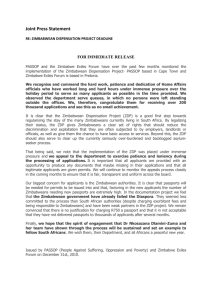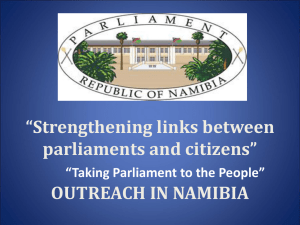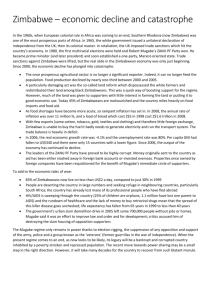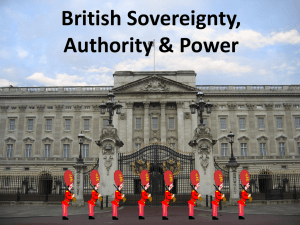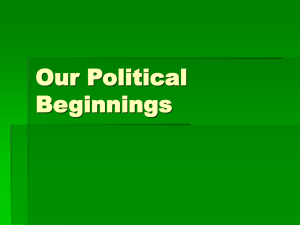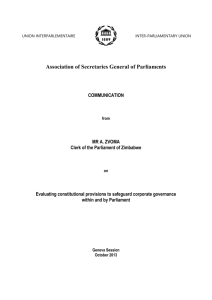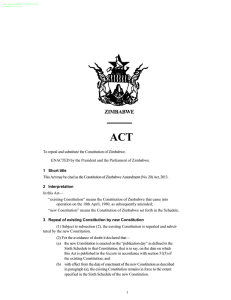Zimbabwe delegation presentation
advertisement
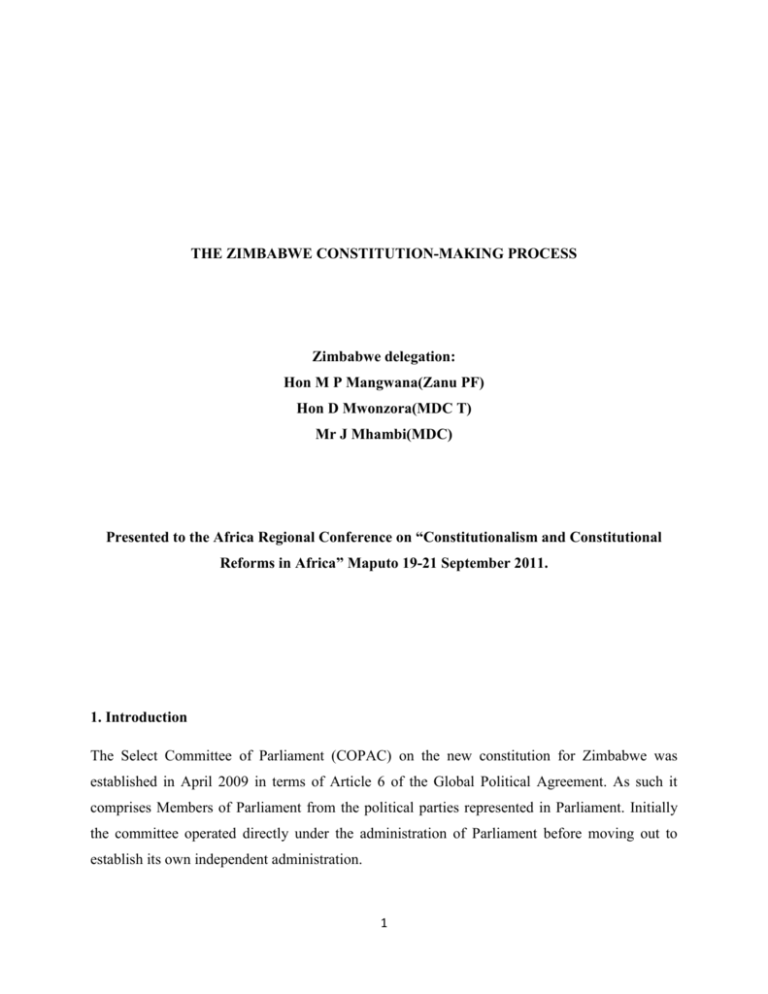
THE ZIMBABWE CONSTITUTION-MAKING PROCESS Zimbabwe delegation: Hon M P Mangwana(Zanu PF) Hon D Mwonzora(MDC T) Mr J Mhambi(MDC) Presented to the Africa Regional Conference on “Constitutionalism and Constitutional Reforms in Africa” Maputo 19-21 September 2011. 1. Introduction The Select Committee of Parliament (COPAC) on the new constitution for Zimbabwe was established in April 2009 in terms of Article 6 of the Global Political Agreement. As such it comprises Members of Parliament from the political parties represented in Parliament. Initially the committee operated directly under the administration of Parliament before moving out to establish its own independent administration. 1 2. Article VI of the Global Political Agreement This article sets both the important stages and the general principles of constitution making process. Under this article the constitution making process must be; a. People driven b. Inclusive c. Democratic 3. Phases in the Constitution Making Process In terms of the Global Political Agreement the Select Committee divided the constitution making process into three phases. These are the Preparatory Phase, the Consultation Phase and the Drafting phase. a. The Preparatory Phase The preparatory phase involved the identification of all the interested stakeholders. This was successfully done and the first All Stakeholder’s conference was convened in July 2009. It came up with the following; It developed 17 thematic areas to guide the outreach teams in soliciting the views of the people. It also laid the principle that in all the organs to be established in this process, civil society representatives had to constitute at least 70% with parliament constituting the other 30%. The conference also adopted the principle that as much as possible, the 50: 50 gender representation principle should be followed. b. The Consultation Phase The public outreach program was launched by the Principals to the Global Political Agreement. These are the President, the Prime Minister, and the Deputy Prime Minister who are also the leaders of the political parties represented in Parliament. At that launch, each principle reiterated the commitment of his party to the constitution making process. They all undertook to respect 2 the views of the people and not to temper with them. There was also a commitment of all the political parties to non violence during the public consultation process. The program was therefore commenced in the spirit of what the principles had directed. At the completion of the outreach, a total of 4 821 meetings were successfully completed. A total of 1 118 760 people attended the meetings and comprised of 416 272 (37%) males, 441 238 (39.44%) females, 252 240 (22.64%) youths and 8 020 (0.72%) being people with special needs. COPAC enlisted the views of Zimbabweans in the Diaspora as well as institutions and other interest groups. At the end of the outreach program therefore we had the following set of views; a. Views of the Zimbabweans gathered in public meetings during the outreach process. b. Views of the Zimbabweans in the Diaspora. c. Constitutional submissions by various Zimbabwean institutions. d. Views of the children e. Views of Zimbabweans living with disabilities. The whole consultation process took about 100 days. During the oureach phase a section of the Zimbabwean civil society demanded that they be accorded observers status.The objective was to have people outside the formal administration of the program to make sure that the outreach process complied with the fundamental principles set in Article 6 of the Global Political Agreement as well as acceptable common international practices. They were allowed to observe this process and will produce their report which we intend to publish as part of oyr report to Parliament. Current Status Currrently the teams are in the process of compiling district, provincial and national thematic reports for presentation to the drafters. In order to satisfy ourselves regarding the accuracy of the data we undertook a process of auditing the reports. The process of draftings will commence, as soon as reports have been cleaned up. Already three principal drafters, Justice Moses Chinhengo, Brian Crozier and Priscilla Madzonga have been identified and agreed upon. They 3 will be assisted by a drafting committee of 15 constitutional experts seconded by the major parties. The challenges The Zimbabwean process is taking place within a particular historic, social, political and economic context. It comes against a background of the civil, social and political unrest that characterized the presidential runoff election of 2008. Despite the odds however we have managed the process to a stage where we are now preparing for the actual drafting process. A number of challenges have the however slowed the progress in this project. a. Finance This project was undertaken at the time that Zimbabwean government was recovering from the great economic meltdown of 2008. It also came at a time when Zimbabwe’s relationship with the international community was at its lowest. Resultantly the program was plagued with financial problems. b. Political polarization The level of endemic political polarization and mutual distrust among the major political parties in Zimbabwe remains very high and this militates against quick progress in this program. c. Political Violence During the outreach program there was a few incidences of politically motivated violence in some areas. This led to a situation where some of the areas had to be redone much at the expense of progress. It also meant a duplication of expenditure. d. Other major factors Some of the factors militating against progress include, lack of a common vision among the stake holders, lack of support from the national institutions like the police and the public broadcaster and the political posturing and propaganda by political parties. Way forward 4 Zimbabweans must pursue this program with more vigour. To that end it must harness all the African wisdom and scholarship. Currently, the Select Committee is working towards mobilizing the delegates for the 2ND All Stakeholders Conference. After this, we shall report to Parliament. Our report shall be debated in Parliament. The Draft Constitution will then be taken to a Referendum when the people will vote for or against it. The Select Committee which is driving this process is determined to make this process a success. 5
